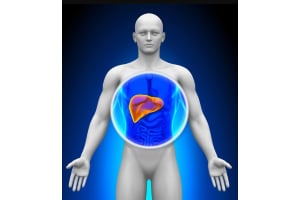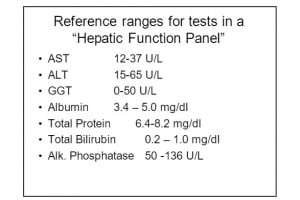Hepatic Function Panel

The liver is the most important organ of detoxification in the human body, and it's so vital for our health and our survival. Even if three-quarters of it gets destroyed, it can regenerate itself into a whole new functioning organ. Now unfortunately in today's environment, there's so much pollution that our livers are being challenged like never before, but there are also other factors, such as the over-consumption of processed foods, alcohol and also pharmaceutical drugs.
Functions of the Liver
Your liver acts as a filter for your blood, and your entire blood supply will pass through your liver to be cleaned several times over a day. Now, if something happens where your liver's detoxification capacities become impaired, then this is when the toxins in your blood begin to build up and disease can set in. But filtering your blood isn't the only function that your liver performs.
It's also responsible for storing glycogen that you can use for energy later on. It produces bile, which helps to break down dietary fats. It's a storehouse for certain vitamins and minerals. It also helps to break down the protein, carbs, and fats that you eat.
Your liver also manufacturers and excretes certain hormones and it helps to maintain stable blood sugar levels. Now, there are several different factors in our modern lifestyles that can lead to a dysfunctional liver and one of the most common is fatty liver. Now, this is a condition marked by an abnormal accumulation of fat in the liver cells. This is typically a chronic condition that develops over several years and often there are no conspicuous symptoms, but the result can be cirrhosis of the liver. In the past, cirrhosis of the liver was most commonly seen in alcoholics, but physicians today are starting to see more and more cases occur in the general population.
Causes of High Liver Enzymes and Toxicity
Some of the common causes are exposure to toxic chemicals, the abuse of pharmaceutical drugs, obesity, and diabetes. Other common causes of a dysfunctional liver are viral infections, Hepatitis B and C. These two conditions combined, affect hundreds of millions of people worldwide.
The good news about hepatitis B is that only around five to ten percent of the cases ever become chronic. Ninety percent of people infected with Hepatitis B will eventually develop antibodies that make them immune to any future infections. Hepatitis C, on the other hand, has a less optimistic outcome for infected individuals. The large majority of cases of Hepatitis C will eventually progress to either cirrhosis of the liver or liver cancer.
The Hepatitis C virus is transmitted via blood and has the potential to become infected from things such as tattoos, sexual contact, or sharing needles with someone who has infected blood. Those are the two main causes when it comes to a dysfunctional liver in our modern society.
Fortunately, there is an effective treatment for hepatitis B (however, many people do not find out they have Hep B until later in the disease). Hepatitis C can now be cured with an effective treatment that lasts only a few weeks. But it is important to find out if you have either by getting tested.
Another factors usually not considered to explain mildly elevated liver enzymes is resistance exercise.
Resistance exercise can increase liver enzymes. Some physicians do not know this and get concerned when they see elevated ALT and AST levels in healthy men without liver disease, excessive alcohol use or medication-related liver effects. Muscular exercise can cause highly pathological liver function tests in healthy men
-
Weight Training Can Increase Liver Enzymes
Categories: TRT Side Effects, Testosterone Blood Tests, Testosterone Lab Tests, liver tests, Bodybuilder lab tests, Hepatic Function PanelTable of Contents Liver Enzyme Tests and Exercise The Effect of Weight Training on Liver Enzym -
High Liver Enzymes: How to Optimize the Health of Your Liver
Categories: CMP test panel, liver tests, Meaning of low and high lab test values, Hepatic Function PanelThe liver is the most important organ of detoxification in the human body, and it's so vital -
The Importance of The Liver Test Panel and Why You Should Get It
The Importance of The Liver Test Panel and Why You Should Get It There is no doubt that the liver



